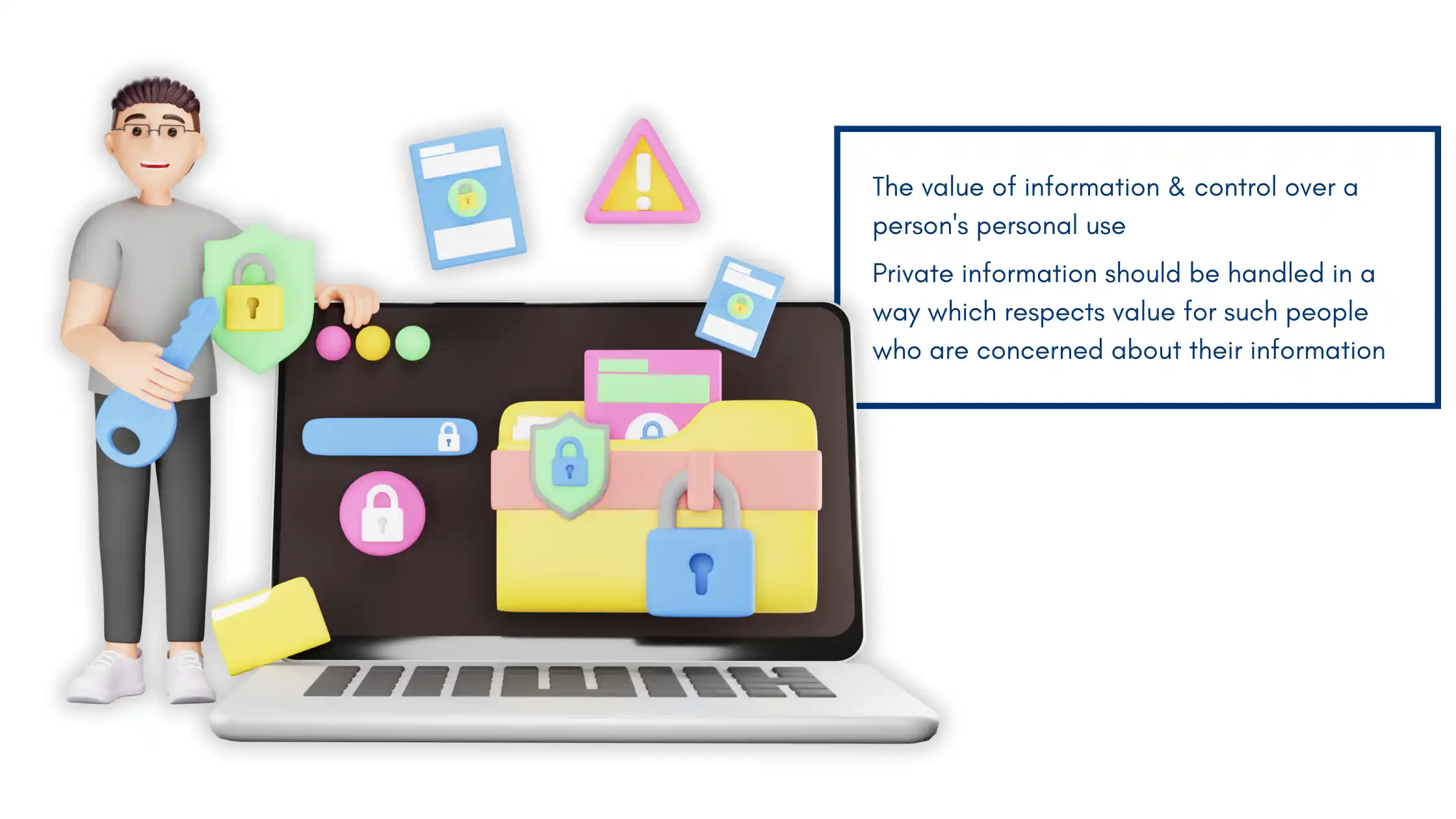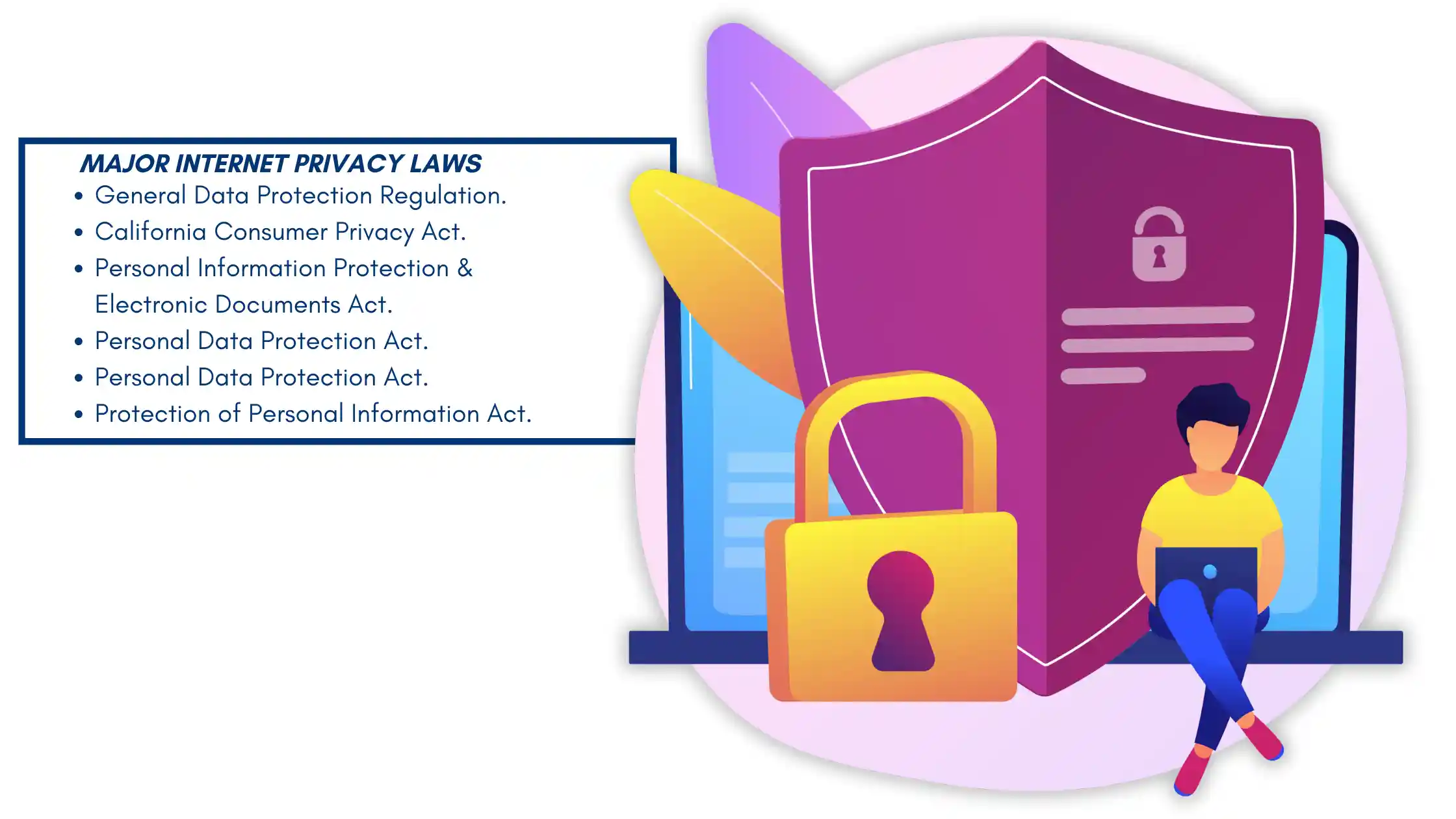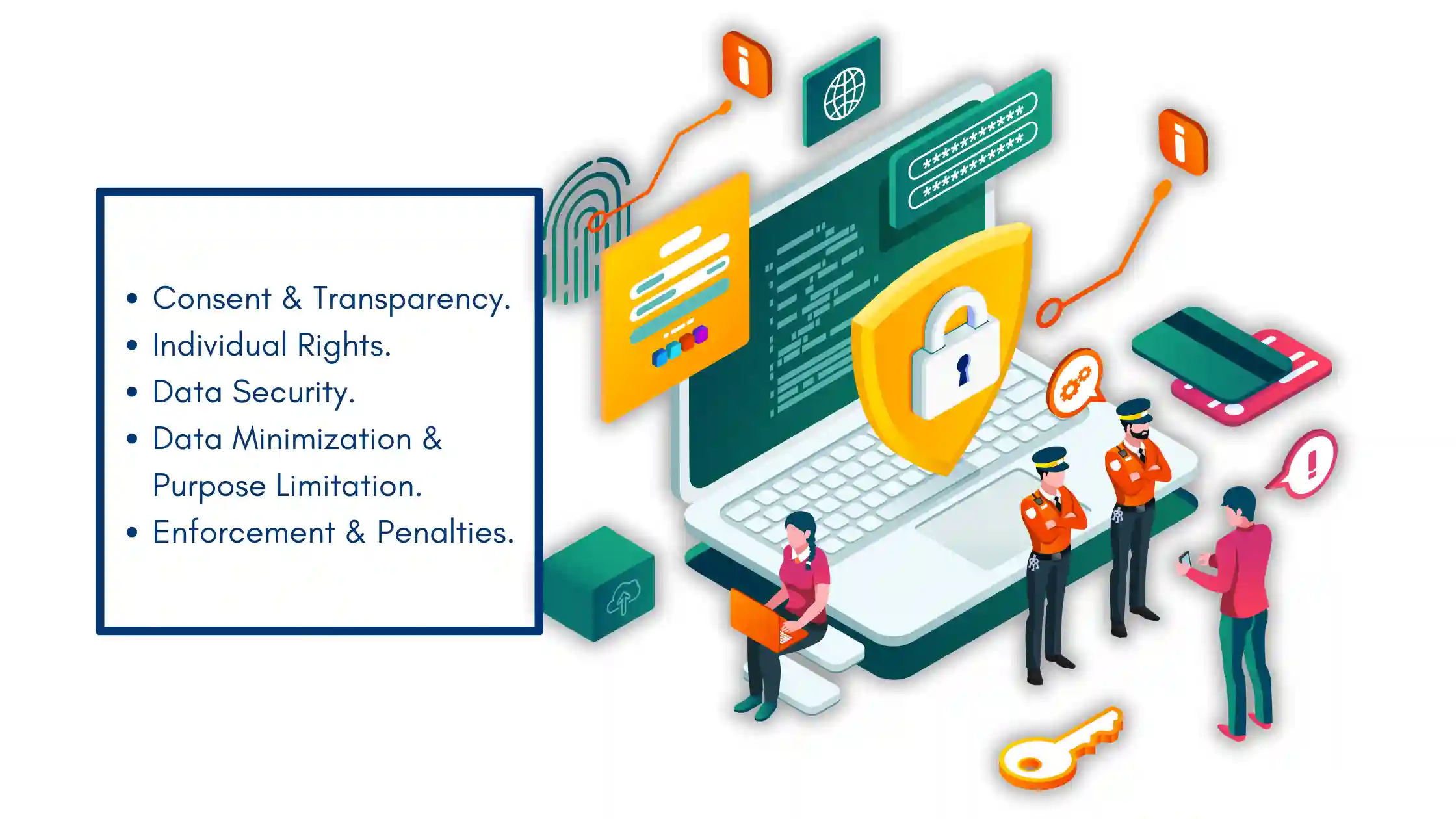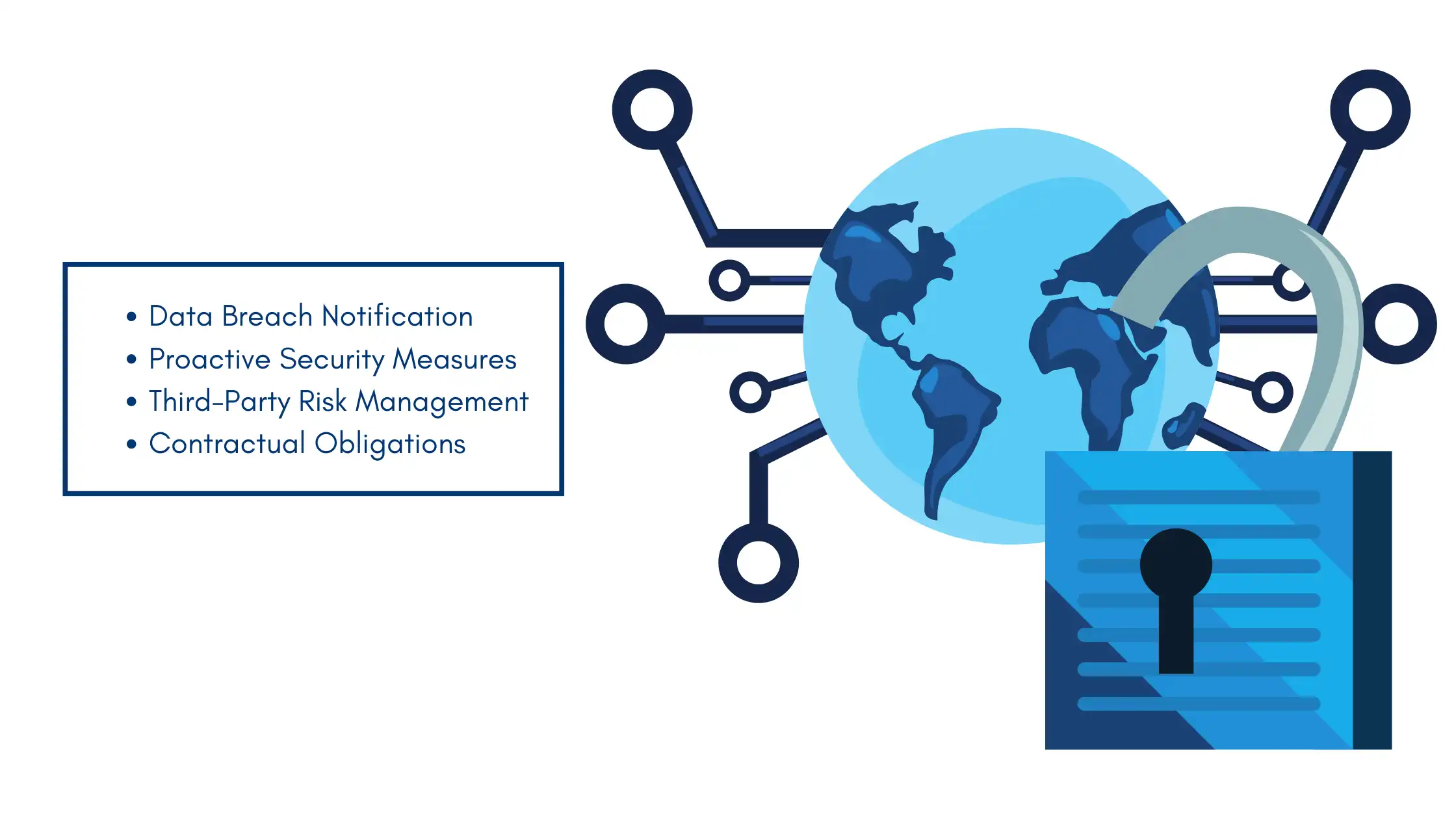Hey there, internet buddies! Ever wondered, “How internet privacy laws protect you and keep you safe online?” We have been there too and after diving into the world of online privacy, we are excited to share some cool insights with you that we found.
Think of these internet privacy laws as your digital bodyguards who are always on the lookout to keep your personal info safe from spying eyes. They are like the superheroes of the internet; they are just missing the capes and cool costumes.
These laws do some pretty awesome stuff. They stop companies from selling your data, give you the power to control your own info and even let you tell websites to forget all about you. Stick around and we will take you on a fun little tour of how these laws work their magic. By the end, you will be the privacy whiz in your friend group. Let us jump right in.
What is Data Privacy?

Information privacy, data confidentiality or data Privacy all refers to the value of information and control over a person’s personal use. It is also known as the term PII (Personally identifiable Information).
It refers to how information should be handled to avoid being accessed and used inappropriately or disclosed wrongly. The data includes personal information such as name, address, phone number files and online activities, but is not limited to these only.
At its core, the idea of data privacy and online privacy protection is a person’s right to determine their own information, like who can collect it, how they have gathered it, and in what way they want to use it.
In other words, data privacy is the idea that private information should be handled in a way which respects value for such people who are concerned about their information being safe from unauthorized access and whether they have control over how it will be used by others.
How Your Private Data is Collected?
In today’s digital age, personal data collection is commonly done by many organizations and ISPs. Internet privacy laws control how this data is gathered to make sure that it is done transparently and ethically.
They also respect the rights and privacy of everyone. Here is a complete explanation of how your data is collected under internet privacy laws. It can be collected by:
Explicit Consent
Internet privacy laws are the first major principle, according to which you can collect personal data only with users permission. This involves:
- Transparency: You are informed before any data is captured, the type of information being collected, its purpose and how it will be used. This is usually done via privacy notices or consent forms.
- Opt-In Mechanisms: Organizations should clearly present options for you to give your full permission before they take any of your data into account. Which means you have to say yes before your data is taken.
Website Interactions
The way your data is most commonly collected is from you in real life and are as likely to be through websites. This can include:
- Cookies and Tracking Technologies: Cookies (which are small data files that websites can send to your browser), pixel tags, local storage and beacons. Many websites use these technologies for gathering your information on how you browse their site etc. For example, cookies can remember the pages you visit, which items in a website you clicked on and how long did users stay at that page.
- Forms and Surveys: When you fill a form or survey on websites, details like name, email id and contact number are required by the website. Organizations need to tell you why this information is being collected and what it will be used for.
User Accounts and Registrations
A lot of online services make you create a user account or sign up for access. This process involves:
- Account Information: When you create an account, they need to know a little bit about you. This usually includes your name and email address. This information must be protected by organizations in line with privacy laws and should only be used for the purposes agreed at registration.
- Profile Data: Certain services may allow you to create a profile or use certain demographic information such as age, gender and interests. This data is used to adjust your experience but it should be stored and managed according to privacy regulations.
Mobile Apps
Apps take a lot of personal information from your mobile device. This includes:
- Device Information: Apps collect information about your device, including its model and its OS. In addition to some other unique identifiers. They must inform you about this data collection and its use-position that privacy laws also protect.
- Location Data: Most of the apps will require location data access which in turn provides localized services.
- Usage Data: Apps collect data about your use of them, including the features you interact with most in an app, how much time you spend using it and any relevant in-app purchases. This data will be used in order to boost performance of the smart feed and provide better user experience.
Social Media and Third-Party Integrations
The social media platforms and third-party integrations that tend to serve as the supply side for personal data influencers are:
- Social Media Accounts: If you use social media platforms, your name and photos from these networks will be visible. These platforms may use that information in line with their privacy policies in which they must obey relevant data protection laws.
- Third-Party Services: Many sites and applications use the third-party services. These third parties may also collect data and these providers only want to use that data so they can provide their service.
E-Commerce Transactions
They collect your personal and financial information when you make an online purchase.
- Payment Information: When you buy something from an e-commerce site it collects your credit card number, billing address and even transaction details. Internet Privacy laws guarantee that such data is handled and processed only securely for the purposes of financial transactions.
- Order Details: When you make a purchase at our store, as part of the buying and selling process, we collect personal information including your name, billing address or shipping addresses, email and phone number. Order history is also used to improve customer service.
Email and Communication
Organizations collect data through your communications with them:
- Email Subscriptions: When you subscribe to Newsletters or Marketing emails and give away your email and preferences. Organizations must ask for your permission and give you an opportunity to say no, due to privacy laws.
- Customer Support: Information you provide when you contact customer service, they collect information such as the content of your contact details and problem description, to process requests from users or improve services.
Surveillance and Monitoring
Data may be collected through surveillance and monitoring in some cases:
- CCTV and Security Systems: They may use cameras in physical locations where they think people might enjoy improved security. These privacy laws determine how this data is stored, used and disclosed.
- Online Monitoring: Service Providers may monitor online and e-mail communication activities for security & compliance purposes.

- Lightning-fast speeds to browse without lag
- Servers in 105+ countries around the globe
- Military-grade security to stay safe online
- Try it risk-free with its money-back guarantee
- Native apps for all major devices
What Are Data Privacy Laws?

Following are the major internet privacy laws around the world.
General Data Protection Regulation (GDPR) – European Union
GDPR Compliance is one of the most complete data privacy laws for every country. It applies to all EU member states and disregarding whether the organization provides their service within or outside the European Union. Key features include:
- Extensive Individual Rights: The GDPR gives users a wide range of rights over their personal data.
- Strict Consent Requirements: Organizations must collect specific and verified consent before collecting any personal information.
- Data Breach Notifications: They must notify authorities within 72 hours of discovering a data breach.
California Consumer Privacy Act (CCPA) – United States
The CCPA applies to California businesses or interaction they have with Californians. Key features include:
- Consumer Rights: The CCPA gives users rights to access, delete and opt out of having their personal data sold.
- Transparency Requirements: If businesses sell consumers’ personal information, a new section in each business’s privacy policy should include an option of “Do Not Sell My Personal Information” link that allows California residents to prevent the sale of their data.
- Penalties for Non-Compliance: Violations may carry fines and penalties granted by the California Attorney General.
Personal Information Protection and Electronic Documents Act (PIPEDA) – Canada
Under PIPEDA, private-sector organizations in Canada may not collect, use or disclose personal information for commercial activity contrary to public bodies must do-eslint. Key features include:
- Consent-Based Model: Organizations must seek informed consent to collect, use and disclose personal data.
- Individual Rights: Users have the right to access and correct their personal information.
- Accountability Requirements: Organizations must implement policies and procedures to make sure they obey PIPEDA.
Personal Data Protection Act (PDPA) – Singapore
The PDPA is the primary piece of legislation governing how organizations collect, use and disclose personal data in Singapore. Key features include:
- Consent and Purpose Limitation: Organizations must get permission and make sure that the data is used only for explicit purposes.
- Data Breach Notifications: Organizations must notify the Personal Data Protection Commission (PDPC) and any user that is affected by a data breach.
- Enforcement and Penalties: The PDPC can impose fines and direct business to follow measures to rectify the gaps.
Lei Geral de Proteção de Dados (LGPD) – Brazil
The LGPD is similar in many ways to the EU data protection government and it also applies to entities operating in Brazil (similarly as GDPR) or processing data related to Brazilian residents. Key features include:
- Individual Rights: The LGPD provides individuals with rights of access, correction and deletion to your personal data.
- Consent Requirements: Organizations must get clear permission before processing private data.
- Data Breach Notifications: They need to inform the National Data Protection Authority (ANPD) and affected users of any data breaches.
Protection of Personal Information Act (POPIA) – South Africa
POPIA controls the processing of personal information by public and private bodies in South Africa. Key features include:
- Consent and Transparency: Organizations need to request for consent and offer clear information on how the data shall be processed.
- Individual Rights: Users have a right to access their personal data, correct it and ask for its deletion.
- Data Security Requirements: Organizations need to provide safeguards to prevent breaches and protect personal data from unauthorized access.
How Data Privacy Laws Protect You?

Data privacy laws are an important part of safeguarding people’s private info and create the process that businesses must use when they acquire, method, store or share details. What do such laws protect personal data from and how? Just keep on reading:
Consent and Transparency
Data privacy laws around the world are grounded in this one simple principle that organizations must collect and process personal data with clear permission from you.
In this way, people know and agree on what will be done with their data. Key elements include:
- Informed Consent: It gives clarity on what data is being collected, why the information is necessary and for whom it would be shared. This information is usually provided through privacy notices or policies.
- Opt-In and Opt-Out Options: People should be able to opt-in for data collection purposes, but also have easy options if anytime they change their mind about it.
Individual Rights
Data privacy laws provide you with a number of rights over the data held about you and its use. These rights often include:
- Right to Access: It grants you access to your personal data and certain other supplementary information so that you are aware as to what information about you an organization holds and how it processes that data.
- Right to Rectification: You can request that incorrect or incomplete information be corrected.
- Right to Forgotten: You are entitled in certain circumstances to have personal data they hold about you to be erased.
- Right to Restrict Processing: If you believe that the accuracy or even how your personal data can be used, then you have a right to request restriction in its use.
- Right to Data Portability: You can ask them for a copy of your personal data in an industry standard format.
- Right to Object: You have the right to form an objection against processing of your data for specific purposes like direct marketing.
Data Security
Data privacy laws require businesses to apply powerful security measures to protect personal data from being accessed by those who should not access it or at least keep the disclosure of protected info private and prevent its destruction amongst other things. These measures include:
- Technical Safeguards: Encrypted data, limited access permissions and security monitoring.
- Organizational Measures: It might also include data handling policies, training staff on data protection measures or incident response plans when there is a breach of the regulation.
- Data Breach Notifications: If a breach is likely to result in risk for affected persons must be notified as well as the respective authority. This helps to reduce the harm of a breach and gives you an opportunity to protect yourself.
Data Minimization and Purpose Limitation
Data privacy laws are based around data minimization and purpose limitation principles to make sure that organizations:
- Collect Only Necessary Data: Organizations need to do nothing but collect data that they require for a clear and specific purpose. This limits the risk and amount of data collected as well as minimizing personal privacy exposure.
- Use Data for Specified Purposes: Data should only be used for the purposes which are clearly stated at the time of collection. An organization must get permission from you if they wish to use the data for any other cause.
Accountability and Compliance
Data privacy laws impose responsibility on organizations in respect of their data processing activities. This includes:
- Data Protection Officers (DPOs): Many data privacy laws require companies to appoint a DPO who is responsible for overseeing obedience with data protection regulations.
- Record Keeping: Businesses need to keep up-to-date data of their records including the types, objectives and with whom that information is shared with.
- Impact Assessments: Conducting data protection impact assessments (DPIAs) to know about the possible risks to your privacy before engaging in any high-risk data processing activities.
- Regular Audits and Reviews: Companies should carry out audits and reviews at regular intervals to be in compliance with data protection laws.
Enforcement and Penalties
They are usually forced by regulatory bodies, which have the power to investigate and punish companies who are known to be violating them. Enforcement mechanisms comprises:
- Investigations: Regulators often investigate the processing of data by a company because of complaints from users or after a data breach.
- Fines and Penalties: Authorities can charge fines on those organizations that break the laws of data privacy.
Data privacy laws provide a complete framework to protect your personal data, highlighting the importance of permission, transparency, individual rights, data security, data minimization, accountability and compliance.
By enforcing these principles and enhancing your knowledge of online privacy, you have a better idea of how internet privacy laws protect you. They are also building trust between you and organizations and guarding privacy in the digital world.

Uninterrupted, high-speed browsing, zero logs so your online activity is always private.
Over 7000 people checked out NordVPN in the last month
Cybersecurity In Internet Privacy Laws

Cybersecurity and internet privacy is an important part of internet privacy laws as it directly addresses the protection of personal and sensitive information from unauthorized access, breaches, and other cyber threats.
Data privacy laws include a variety of cybersecurity measures to protect the integrity, confidentiality and availability of personal data.
The cybersecurity aspect of internet data privacy laws is fairly complex and this article will explain how that works in detail.
Data Breach Notification
Internet privacy laws often require organizations to report data breaches both to a relevant authorities or law enforcement agency and in some cases, users who are affected.
This makes transparency possible for others to protect themselves if there is need. Key points include:
- Timely Notification: Laws, such as GDPR, compel businesses to inform authority of the occurrence within 72 hours as they become aware that data security has been breached. Notification must inform the nature of breach, what type data was busted and also cookie telling prevention measurements taken by a hacked user.
- Informing Affected Individuals: One of the important things is that organizations must notify the affected user after a breach has occurred including information on what happened and steps they can take to protect themselves.
Data Protection by Design and by Default
Data Privacy laws highlight “data protection by design” and “data protection by default”, including cyber security into the systems. Operations which need to be implemented while development of the system or process itself. This includes:
- Proactive Security Measures: Implementing security measures to protect personal data proactively, starting with the design and development stages of your systems or applications.
- Default Privacy Settings: Stakeholders must design all applications and services with default settings that prioritize user privacy while requiring only a minimum of user changes to protect their information.
Third-Party Risk Management
Internet privacy laws require that organizations verify that third-party service providers who will be processing personal data on its behalf must comply with cybersecurity and data protection obligations. This involves:
- Due Diligence: Security assessments of third-parties to prevent future data breaches.
- Contractual Obligations: This may involve specific proper data protection and cybersecurity clauses in contracts with third party vendors.
- Regular Monitoring: Continuous tracking third-party vendors to make sure that they are meeting cybersecurity protocols.
Frequently Asked Questions
What do privacy laws protect?
How can data privacy be protected?
What are the benefits of data privacy?
What does the Privacy Rule protect?
Why does data privacy matter?
Conclusion
What a ride through the world of internet privacy laws. We started off wondering how these laws protect us and now we are practically privacy superheroes. Remember when we said these laws were like your personal bodyguards? Well, now you know they are more like a whole security team, complete with ninja-like data protection skills and x-ray vision for spotting sneaky data breaches.
From the GDPR’s iron-clad grip on data in Europe to the CCPA keeping things in check in California, we have seen how these laws are working hard to keep our digital lives safe and sound. They are giving us the power to save our data from companies trying to misuse it and the ability to peek behind the curtain of what info is being collected about us.
Stay safe out there, privacy pals. The internet might be wild, but with these laws on our side, we are ready for anything it throws our way. Now, go forth and browse with confidence.






